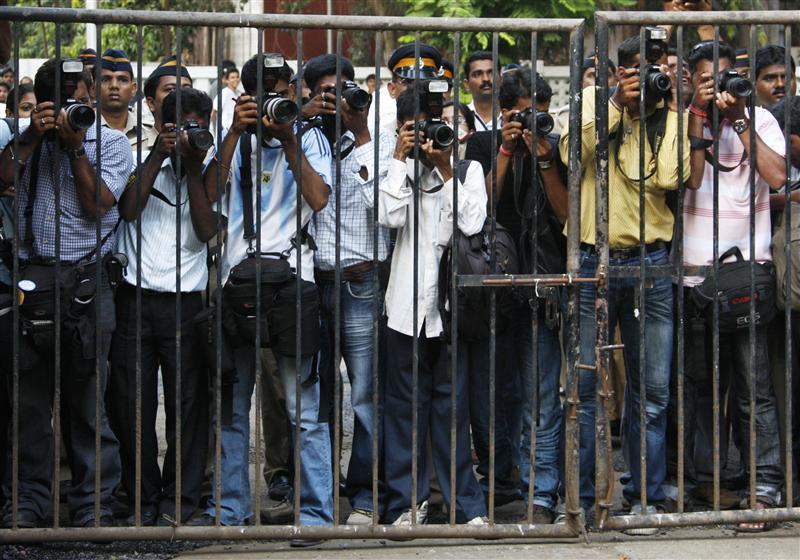Media Gag: A Judicial Hindrance?
In India, gag orders are issued as a preventive step sometimes quoting the sensitivity of the case, while at other times, the safety and security of the people involved.
F
reedom of Press is one of the founding pillars of a democracy. This freedom enshrined under Article 19 of the Constitution has been subject to unceasing limitation and restriction, by all three institutions of the government. Be it the Proclamation of Emergency in 1975 or the blatant abuse of limitations to this freedom, governments have exerted authoritarian control when it comes to the Freedom of Press. The judiciary seems to be making no exception to this grave concern as could be seen through its rising gag orders against the media.
 Indian press photographers stand behind a fence for security reasons as they take pictures of Belgium’s Queen Paola in a school in Mumbai November 6, 2008. Belgium’s KingAlbert II and Queen Paola are on a official state visit to India. REUTERS/Francois Lenoir (INDIA)
Indian press photographers stand behind a fence for security reasons as they take pictures of Belgium’s Queen Paola in a school in Mumbai November 6, 2008. Belgium’s KingAlbert II and Queen Paola are on a official state visit to India. REUTERS/Francois Lenoir (INDIA)
Sahara India Real Estate Corporation Limited and Ors. Vs. Securities and Exchange Board of India and Anr., popularly known as the Media guidelines case, this judgment clearly brings out the position of law with regard to orders postponing media publication. The Court observed that such orders can only be passed when necessary so as to “prevent real and substantial risk to the fairness of trial.” It was further observed that such orders could only be for a limited duration and that the content of such publication shall not be disturbed. Nonetheless, it was made clear that it would not enumerate the categories of publication falling under the law of contempt. Thus, the Court sought to ensure proper administration of justice through this decision. This, however does not seem to be true for a significant number of postponement orders that disregard the rule of “clear and present danger” as observed in Reliance Petrochemicals Ltd. v. Proprietors of Indian Express Newspapers Bombay (P) Ltd case.
Jay Shah Defamation Suit
Jay Shah, the son of BJP President Amit Shah had filed a civil defamation suit of Rs. 100 crore against editors of a media house over an article that covered a rise in his company’s turnover from Rs 50,000 to over Rs. 80 Crore since the NDA came to power. Restoring the gag order, The Gujarat High Court debarred The Wire from publishing any article that relates to Jay Shah’s business
Parvez Parwar vs. State of U.P and others (2008)
When the Chief Minister of Uttar Pradesh, Yogi Adityanath was alleged to have instigated communal violence, the Allahabad High Court passed an order that gagged the media from reporting on any a proceeding that sought permission for his prosecution. The sanction to prosecute the Chief Minister was denied by the UP Government in response to which the petitioners claimed an imminent bias as the Chief Minister himself was involved. Prohibiting the media from reporting, the Court held “we are constrained to pass the order directing that no one shall publish or cause to be published any proceedings of this case till the delivery of the judgment.”
Rubabbuddin Sheikh vs State Of Gujarat & Ors
The Sohrabuddin Sheikh encounter case witnessed a special CBI court gag order, restraining the media from reporting the trial. The order was quashed and set aside by the Bombay High Court observing that “The rights of the press are intrinsic to the constitutional right to freedom of expression. In reporting from an open trial, the press not only makes use of its own right, but serves the larger purpose of making such information available to the general public. The press is the most powerful watchdog of society.” Under the Code of Criminal Procedure, a fair trial was relevant and exception could be made only on rare occasions. Upholding the relevance of fair trial under the Code of Criminal Procedure, it observed that exception could only be made on rare occasions. Sensationalism alone cannot cause to deprive the media from its right to publish.
Despite this judgment by the Bombay High Court, there exists an air of ambiguity and confusion with regards to the Freedom of press to report on court proceedings. Even in the popularly known media guidelines case, the Court refrained from establishing a Code for itself or the media to follow when it comes to Gag Orders. The media plays a crucial role in citizen awakening and keeping a check on the authority of institutions of governance. The blatant misuse of law to curb its freedom compels us to question the intentions of other pillars of democracy.
